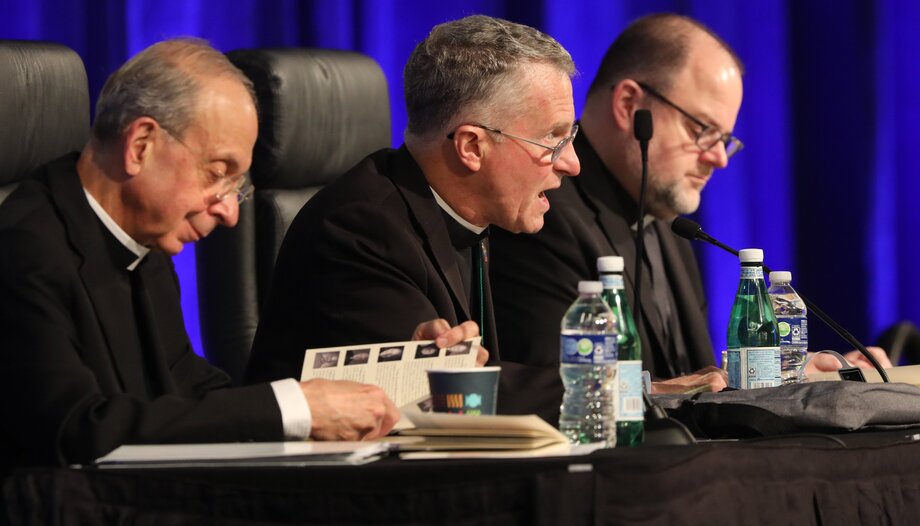On Friday, June 16, the Spring Plenary Assembly of the United States Conference of Bishops (USCCB). It was a time of discussion, prayer and fraternal sharing among the bishops. During the Assembly, the progress of the National Eucharistic Congress in 2024 was presented, the Synod on Synodality and World Youth Day were discussed. The prelates also approved several documents including a guide for the ongoing formation of priests and a new translation of some parts of the Liturgy of the Hours.
The bishops also agreed to initiate the drafting of a new pastoral statement for persons with disabilities in the Church. They also approved a new pastoral plan to strengthen Hispanic ministry and finally agreed to continue with the process for the cause of beatification and canonization at the diocesan level of the "Martyrs of Shreveport" in Louisiana.
New National Plan for Hispanic Ministry
The new plan focuses on the realities of the pastoral hispana. It is the fruit of the V Encuentro Hispano and includes vital aspects for developing Latino ministry in the coming years at the national, diocesan and parish levels. The text outlines a set of objectives for pastoral practices that prioritize the encounter with people from the peripheries with a message of welcome and hope. Each of the points has precise dates for accomplishing the goals, which begin in 2023.
The objectives are to support lifelong learning and ongoing conversion; provide sacramental preparation and mystagogical catechesis; assist Hispanic parents in the transmission of the faith to their children; strengthen marriage formation in the community; formation of leaders in the domestic church and pastoral accompaniment of families. The plan also seeks to reach out to Hispanic youth to form them as missionary disciples and provide them with ongoing spiritual and pastoral formation.
The goals of the new plan also include providing pastoral care and accompaniment to families separated due to deportation or detention; advocating for comprehensive and just immigration reform; and accompanying Hispanics in discovering their gifts and discernment for ministry in the Church and service in society. The text also marks as an important goal the formation of liturgical ministers for Hispanic communities as well as increasing the number of Hispanic vocations to the priesthood, consecrated life, permanent diaconate, lay ministry and marriage.
The Shreveport Martyrs
As in other Assemblies, the bishops discussed and approved causes for beatification and canonization. In this meeting the protagonists were the "martyrs of Shreveport". Five Servants of God of French origin: Jean Pierre, Isidore Quémerais, Jean Marie Biler, Louis Gergaud, and François LeVézouët, who exercised their ministry in Louisiana and died during the yellow fever epidemic of 1873, one of the worst plagues ever recorded in the USA. The city lost a quarter of its population in less than three months.
The priests were recruited by the bishop of the now defunct diocese of Natchitoches, Louisiana, Auguste Marie Martin who went to Rennes, France to extend to them an invitation already circulating in France to recruit priests and seminarians to serve in Florida and Louisiana. The prospects did not sound very encouraging: "We offer you no salary or rewards, no vacation or pension, but a lot of work, poor housing, few comforts, many setbacks, frequent illnesses, a violent or lonely death and an unknown grave.
In spite of this warning, the five Breton priests accepted, keeping in mind the teachings of St. Paul: "The sufferings of this present time are not worthy to be compared with the glory that is to be revealed in us. Who shall separate us from the love of Christ? tribulation? distress? persecution? famine? nakedness? peril? sword? For I am sure that neither death nor life nor angels nor principalities nor things present nor things to come nor powers nor height nor depth nor any other creature will be able to separate us from the love of God manifested in Christ Jesus our Lord" (Rom 8:18,35,38-39).
In October 1873, the martyrs of Shreveport died imparting the sacraments to the sick and dying, exercising their priestly ministry. A few days before his death, some parishioners warned Father Le Vézouët that if he continued his work with the people he would die of the epidemic. To which he replied: "I know. But I think I am taking the safest and shortest way to Paradise".
Learn more about the martyrs of Shreveport: https://shreveportmartyrs.org/









